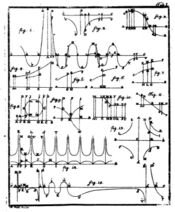Template:Are You Sure/February 13: Difference between revisions
No edit summary |
No edit summary |
||
| Line 1: | Line 1: | ||
[[File:Theoria_Philosophiæ_Naturalis_(1763)_-_first_page_of_figures.jpg|thumb|175px|link=Roger Joseph Boscovich (nonfiction)|The first page of figures from ''Theoria Philosophiæ Naturalis'' (1763) by polymath [[Roger Joseph Boscovich (nonfiction)|Roger Joseph Boscovich]]. Figure 1 is the force curve which received so much attention from later natural philosophers such as Joseph Priestley, Humphry Davy, and Michael Faraday. The ordinate is force, with positive values being repulsive, and the abscissa is radial distance. Newton's gravitational attractive force is clearly seen at the far right of figure 1.]] | [[File:Theoria_Philosophiæ_Naturalis_(1763)_-_first_page_of_figures.jpg|thumb|175px|link=Roger Joseph Boscovich (nonfiction)|The first page of figures from ''Theoria Philosophiæ Naturalis'' (1763) by polymath [[Roger Joseph Boscovich (nonfiction)|Roger Joseph Boscovich]]. Figure 1 is the force curve which received so much attention from later natural philosophers such as Joseph Priestley, Humphry Davy, and Michael Faraday. The ordinate is force, with positive values being repulsive, and the abscissa is radial distance. Newton's gravitational attractive force is clearly seen at the far right of figure 1.]] | ||
• ... that polymath '''[[Roger Joseph Boscovich (nonfiction)|Roger Joseph Boscovich]]''', in his ''[[De viribus vivis (nonfiction)|De viribus vivis]]'' ("On living forces"), tried to find a middle way between [[Isaac Newton (nonfiction)|Isaac Newton]]'s gravitational theory and [[Gottfried Wilhelm Leibniz (nonfiction)|Gottfried Leibniz]]'s metaphysical theory of monad-points, and that Boscovich proposed a concept of "impenetrability" as a property of hard bodies, explaining their behavior in terms of force rather than matter? | • ... that polymath '''[[Roger Joseph Boscovich (nonfiction)|Roger Joseph Boscovich]]''', in his 1745 book ''[[De viribus vivis (nonfiction)|De viribus vivis]]'' ("On living forces"), tried to find a middle way between [[Isaac Newton (nonfiction)|Isaac Newton]]'s gravitational theory and [[Gottfried Wilhelm Leibniz (nonfiction)|Gottfried Leibniz]]'s metaphysical theory of monad-points, and that Boscovich proposed a concept of "impenetrability" as a property of hard bodies, explaining their behavior in terms of force rather than matter? | ||
• ... that mathematician '''[[David Hilbert (nonfiction)|David Hilbert]]''' was among the first to distinguish between mathematics and metamathematics? | • ... that mathematician '''[[David Hilbert (nonfiction)|David Hilbert]]''' was among the first to distinguish between mathematics and metamathematics? | ||
Revision as of 06:27, 14 February 2020

• ... that polymath Roger Joseph Boscovich, in his 1745 book De viribus vivis ("On living forces"), tried to find a middle way between Isaac Newton's gravitational theory and Gottfried Leibniz's metaphysical theory of monad-points, and that Boscovich proposed a concept of "impenetrability" as a property of hard bodies, explaining their behavior in terms of force rather than matter?
• ... that mathematician David Hilbert was among the first to distinguish between mathematics and metamathematics?
• ... that mathematician and alleged time-traveller Niles Cartouchian supposedly exists as several individuals existing in simultaneous entangled quantum states, and that these individual "brothers" can apparently communicate with each other despite living in different centuries?
• ... that physicist and radio engineer Karl Guthe Jansky discovered radio waves emanating from the Milky Way while investigating sources of static that might interfere with radio voice transmissions, and is considered one of the founding figures of radio astronomy, yet radio astronomy remained a dormant field for several years, due in part to Jansky's lack of formal training as an astronomer?